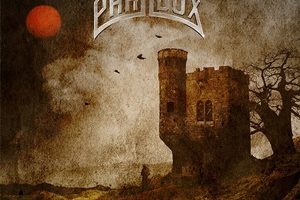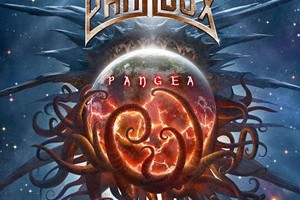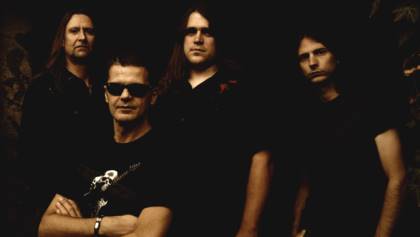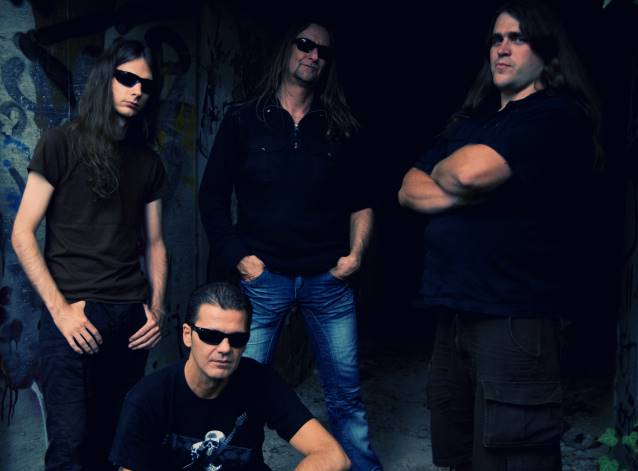Paradox – Power Through Heresy
Tuesday, 19th October 2021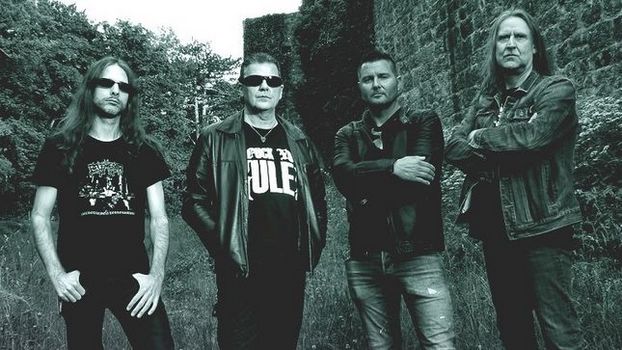
Normally we don’t experience sequels three decades plus away from the original product – in any art form. Such is the case here though for German speed/melodic thrash band Paradox. Their second album Heresy hit the streets on Roadrunner and made a decent impact for its tight riffing, solid tempos, and key vocal inflections from guitarist Charly Steinhauer. These musicians took a page from the Bay Area thrash scene like Metallica and Exodus, adding in aspects of Metal Church, Forbidden, and Flotsam and Jetsam as far as hooks, melodies, and harmony elements to their sound.
This year Heresy II – End of a Legend hits the streets. A sprawling thirteen track effort taking over seventy-five minutes to process, it’s another heartwarming effort for those who love impressive musicianship, interesting transitions, tons of darker atmosphere, plus a vivid throwback sense to the legacy of speed/thrash/power metal, while also taking into account the measures and evolution of the genre today. We reached out to Charly and he brought us up to speed on the record, the work behind it, the specific choices of musicians, thoughts on his love of 80’s Metallica, favorite concert memories, and an update on his health issues.
Dead Rhetoric: Heresy II – End of a Legend is the latest Paradox album – a sequel to Heresy from 1990. Why did you finally decide to come up with a second part to this saga – and discuss the choices you made as far as bringing back Peter Vogt for the lyrical concepts and the lineup choices for the record?
Charly Steinhauer: It was not my idea to do a second part of Heresy because it is a classic for many heavy metal fans. It wouldn’t make sense to make another copy of Heresy from 1989. I was in contact all those years with Peter Vogt, and when he asked me, he told me he had written a story that he had on his shelf, it would be interesting to do another part of the Heresy story. I was working on the previous album Pangea at this time, and I said the story doesn’t fit to the songs I did for Pangea. But I was excited with what he showed me and offered me. After Pangea it was the right time, we started working on this in 2019. He gave me thirteen titles to put the music on. I started working on the instrumental version of this album over the next five months. It was very easygoing work with Peter – we never changed anything, and we did it on the same way as the first Heresy record. I’m so happy with the results.
This new lineup was for many reasons. Gus Drax and Kostas Milonas who played on the Pangea album, the guitar player and drummer, were not in the band. The only permanent band member was Tilen Hudrap, who played in Vicious Rumors at this time. Tilen went to U.D.O., so after this I knew I had to search for a new lineup. I was in contact to Olly (Keller) on bass still, and I also met Christian (Münzner) again. I went into a concert and a woman came up to me and asked if I was Charly Steinhauer – as she talked with Chris and told me some greetings. Two days later I wrote to Christian, asked him what he was doing music-wise and wanted to see if he could join Paradox again. He said he would, it was so easy to get this lineup together. Olly left the band after Tales of the Weird because he has a health issue, nerves in the fingering. It took years for him to go from finger playing to pick playing. That’s why he could join Paradox again. We are long-time friends. Axel got the fire back to play drums again. He’s a co-founder of Paradox. He would visit me each week, drink coffee together and talk about music. He asked during the recordings of Pangea if he should start playing drums again, he knew that I had to search for a new drummer. He is my best friend, he started working at the drums each day for two years.
Dead Rhetoric: Which songs came easiest to you on the new record – and were there any specific songs that maybe took a little more time pull together due to intricacies, speed, or transitions?
Steinhauer: No, I had no problems during the songwriting. The only problem is the playing time on a CD – the possible playing time is only 80 minutes. When I start composing a song, I don’t look for how long a song should be. It was getting really close to what was possible. When I start writing a song, I start it from the beginning until the end. When I have one song completed, then I move on to the rest. I had thirteen titles, and I did it without a break. I started in July of 2019 and was finished in December 2019. It was a huge process, a very complex process.
Dead Rhetoric: When it comes to your work as a songwriter, guitarist, and vocalist – which areas do you believe take the most time to lock in and develop? Has the process evolved and changed now this deep into your career, or are certain aspects tougher/harder than others because of getting older?
Steinhauer: The biggest process is the vocals. It’s easy for me to play guitar, I never have a lack of ideas when I play the guitar. With vocals, it’s much more difficult. It took as long as the whole songwriting process to record all these vocals. I did all the harmony vocals as well – this was very exhausting. I guess the result was my best performance.
Dead Rhetoric: Tell us about the Travis Smith artwork for this album – have you always been a follower of his work over the years, and what do you enjoy most about the work that he did for this record?
Steinhauer: The artwork of Travis Smith, I was always a big fan of his artwork with Opeth and Nevermore. One of my favorite albums in that style is Blackwater Park from Opeth, and he did it. It was exactly the way I wanted to work, totally easy-going. Travis is a professional. The communication was perfect. There was no lack of communication, he gives ideas into the music. I sent him a demo tape, and with the atmosphere of these songs he did the cover. Peter Vogt the lyricist had the main idea of what should be on the cover. This cover comes from the south of France where all these things happen. I didn’t want to have skulls on the cover, it should be mystic a little bit. I wanted an original place with its landscape, and it’s a mirror to the music. If you see this, you know something must be happening on this album.
Dead Rhetoric: You have professed a strong affinity for the work of Metallica and their first three albums – does their work from 1983-1986 still inspire you today, and what are the key elements that you believe you try to put your own spin on within Paradox from that bygone era of early speed/thrash metal?
Steinhauer: Of course we are most inspired by Ride the Lightning and Master of Puppets. We are inspired as well by Bonded by Blood from Exodus, Twisted into Form from Forbidden. This Bay Area style we transported to Europe. This inspiration helped us a lot, we wanted to be as good as them – which is nearly impossible. Not nowadays, we’ve found our own style. I have a unique voice color, it sounds different than other singers. Some people compare it to Joey Belladonna from Anthrax or Eric AK from Flotsam and Jetsam. We’ve found our own style now, and this is a good thing. We have done this now for thirty-five years.
Dead Rhetoric: When it comes to your guitar technique, how much practice did you have to put in to develop the rhythm guitar attack? You have a distinct, powerful style in that manner.
Steinhauer: Thank you for the compliment. Maybe it’s because I play upside down – playing a left-handed guitar with right hand strings. That’s rare and makes a special sound. How I play the guitar, my left hand during high school I was a drummer. So in my brain I’ll always be a drummer. This helps me a lot to move my rhythm hand, and to do these special things which may be normally difficult for others. This combination of my style, the drumming in my head, is the result of my playing.
Dead Rhetoric: How has your health been since your open-heart surgery following the Tales of the Weird album release back in 2012? Has the pandemic made you even more cautious regarding your health these days?
Steinhauer: To be honest it took years to come back. I saw what happened recently with Richie from Judas Priest, and my heart is crying for him now. He must be going through some tough times. It was a six-hour open heart surgery on the 24th of December. I was really, really close to dying. I had 18% of my heart power. If you believe, if you fight against it in your brain, you get more power than if you give up. I never gave up for anything. I never gave up with Paradox. We could have been one of the biggest bands in the world if I made touring important like others do. I believe in the music though and this kept me strong, all these people writing to me all over the world. They knew I was in the hospital, I read the letters, and the greeting helped me. I still have afterward psychological moments when I get in fear, a fear of death. When I can’t sleep, I get heart rhythm failures, and I don’t wish it on anyone. I am still alive, and as long as I am still alive, the fight goes on. I love making music, and now it’s a good feeling to release this record. It is a big album.
Dead Rhetoric: Where do you see the major differences in the metal scene currently versus your time in Paradox during the 1980’s and 1990’s?
Steinhauer: The big difference is the internet, but I don’t know. Because it changed a lot, the way how fans act together with each other. I remember when it was the 1980’s, it was just like a family when you went to a concert. You may not have known these people, but when we were together you were all there celebrating the music. Today, I see too (often) people who write too many bad comments about bands on the internet. I don’t know if these people had the same thoughts in the 80’s but didn’t talk about it. We must all be a big family. It is our music, and heavy metal music shouldn’t be destroyed. When we talk bad about other bands – if you don’t like a band, just listen to other bands that you like. The tastes of everyone (are) different. You can’t expect that you will make everybody happy. I knew this with this album as well. Some fans will think it would be great to make a second album that would sound like the first part of Heresy. But then I would be copying myself as a composer, and that’s a no go. You have to develop, and that doesn’t mean that I wouldn’t be able to compose again an old school record. I have visions for the next record that it could be more old school like this.
Dead Rhetoric: What worries or concerns do you have about the world that we live in today? If you had the chance to impart a specific message or words of wisdom to the general public that could improve their outlook, what would you like them to consider or think about?
Steinhauer: It is a weird situation. I’m not a pessimist, I’m an optimist. If I look into the future, I’m not so positive because I remember back to the 80’s, the feeling we had. And then comes the pandemic, it has destroyed art, you couldn’t go to concerts, the lost connection to other people. I hope this comes back as soon as possible, it took two years and what if you are sixteen years old… and then turn eighteen, a lot of things are lost. You want to party, search for a girlfriend, you struggle.
Dead Rhetoric: What are some hobbies, interests, and passions that you have away from music when you need that fresh mental, emotional, and physical recharge?
Steinhauer: (laughs). I like to play games on my Playstation. I like to go out in nature. I walk each day five miles to keep myself strong, and for my heart and my breath. I meet friends, I meet band members, I go to the rehearsal room. I must know what is happening in the world each day. I try to get enough sleep that I am fresh on the next day. I am never bored. Boring is a strange word to me.
Dead Rhetoric: How do you view life in your fifties compared to how you spend life in your twenties and thirties? Do you have any regrets about how you have lived your life to date?
Steinhauer: Yes, the one thing is this open-heart surgery changed my life completely. I think more before I say something, that may be an older and wiser thing. You think more what you are doing. You focus more on things. I remember when I wrote the first Heresy record, I picked up my guitar and I did two songs in one day, it flows out of me. I didn’t think anything of how it should sound. Nowadays you think about how things should sound, you can’t use each part just because a certain part is needed. It must be perfect, and more than the past part for me. It must be better than before, it’s a pressure but a good pressure because I do this for passion.
Dead Rhetoric: We talked on social media about your first show with Judas Priest opening for AC/DC back in the late 70’s – what do you remember about this show, and what have been some of your other favorite concert memories?
Steinhauer: I remember this was my first concert, in my hometown in South Germany. AC/DC was the headliner and Judas Priest was the opener, Unleashed in the East in the 70’s. Some bands were calling out ‘Priest’ – I saw Halford enter the stage. What a great singer, the leather outfit, he came out on a motorcycle. It was great. Everybody expected that AC/DC… it would be difficult for them to top this, but I must say they topped it. It was awesome.
I saw Bon Scott twice at another festival when suddenly he was not on stage anymore with Angus Young. They were in the front row – we heard Angus playing lead guitar, and Bon had Angus on his shoulders while he was playing with no cable. He walked in front of me, I could touch him. I knew I would do music in my life, must find a band and learn the guitar.
I visited other great shows – the first show for Mercyful Fate in Germany, first show for Metallica. I met James Hetfield walking on the street, shook hands and we talked together. I got an autograph from Cliff Burton. So many memories I have that I could write in books.
Dead Rhetoric: How do you handle the criticism that people level on your music? Online the only criticism I’ve heard about the new record is in regards to the production and the guitar tones?
Steinhauer: This is also a bit weird because here in my studio it sounds great. I gave it to the whole band, they said it sounded great. I didn’t want to do the production, I wanted to work with Andy Sneap or Juan Urteaga, I am in contact with Juan. If you don’t have enough money, you must do what you have (to) with your own resources. The whole band thought I was able to mix this album. I don’t know if I could do this, I tried. We mixed and mixed, I did everything I could. At the end of the production, I heard something in the guitars I didn’t like, I must be honest. It is true, I had to improve the sounds of the guitar because this is my trademark.
I wouldn’t say it’s a bad production, it depends on which system you hear the record. If you have a subwoofer, I have heard it doesn’t sound as good – but in my car, it sounds great. Most of the reviews we’ve got, the sound is great. I know what I have to do for the next album. It’s always in the beginning it’s difficult. The next album will sound different of course.
Dead Rhetoric: What’s on the horizon for Paradox now that the album is out? How many more years do you foresee still developing music?
Steinhauer: With my passion and the fire in me, I can’t see any end for me. The end of the Heresy series, there will be no part three. I think I could do this for ten years or more. Right now I prepare for the next Paradox album. It will not take five years anymore, I have the time and I am in the mood for it. The response for this, over fifty reviews and they have been great. I’m very surprised they like the album, because it’s so long at seventy-five minutes. The album grows on people. It is not a record for one run.











